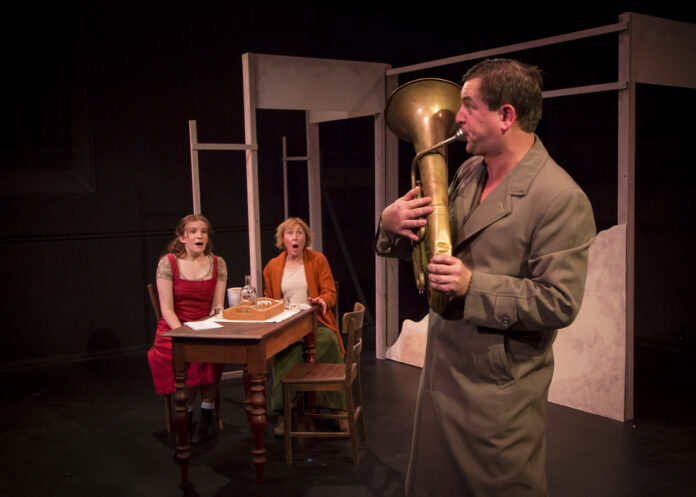True to their long held charter, Red Phoenix has yet again trodden new ground with this early Soviet dark comedy. Director Brant Eustice and his cast managed something quite difficult – to adopt and sustain a stylized, mostly declamatory, performance which extracted both subtle and very blatant criticism of the Soviet regime, while maintaining the comic content. Once Stalin came to power, he allowed some rehearsals of the play but did not ever permit a public performance. It’s easy to see why he didn’t.
In essence, the plot centres on an unemployed worker, Semyon, who is so depressed by his lack of work and opportunity, that he decides to suicide. Many representative groups in Russian society want him, if he takes his own life, to die in their name. In these interactions lie the main satirical elements of the play, as well as the very serious points about the relative importance of society and the individual, life, death and life after death.
Joshua Coldwell, as the protagonist Semyon, carried a huge load, and he did it with skill, conviction and a clear comic appreciation. He sustained a high level of energy and interacted well with the broad array of other characters. He was especially effective in dealing with the complex relationship with his wife Maria, and mother-in-law Serafima. And in Act 2 he really stood tall, particularly in the banquet scene, and also in his vacillating over the timing and methods of his suicide.
Bobbie Viney was most effective as Maria, Semyon’s wife. She subtly showed her suffering, confusion and dismay in handling her husband’s erratic moods and behaviour. She also worked well with Sharon Malujlo who played her mother, Serafima. While Malujlo brought welcome comedy to the family’s predicament, between them they clearly brought out the frustration of the poverty and hunger facing such people as themselves at that time.
As the neighbour, Alexander, Geoff Revell gave an energetic and convincing performance. Alexander’s entrepreneurial dealings were important to the play’s themes and Revell’s interactions with the experienced and highly competent Kate Anolak, playing Alexander’s lover, Margarita, were a delight.
While the playwright, Nikolai Erdman, was clearly critical of the Soviet regime itself, he also readily satirised other groups in the society. They were represented in the play by a number of exaggerated individuals. Notable among them was Michael Eustice who gave his sonorous voice and appropriate bombast to the role of Aristarch, who pushed the intelligentsia’s case to have Semyon die in their name. Even more flamboyant was Samuel Creighton who played the effete poet Viktor, representing the Arts which he argued had been drastically overlooked by the new regime. Tom Tassone did well, too, as the insufferable, fanatical Soviet postman, as did the pair of competing vamps, Nicole Rutty as Cleopatra and Ruby Faith as her rival Raissa. Russell Slater had an obvious grasp of the satirical importance of his role as Father Elpidi, and Callum Logan was controlled and believable as the deaf mute young man.
The action was played on a simple set, with cut-away wall panels, and black surrounds which was a suitable setting for the style and content of the play. The pace suited the play’s themes and noticeably picked up after the opening scenes. The banquet scene in Act 2, was wonderfully full of action, in which the many characters interwove their styles and aspirations. All of this was silently and menacingly noted by a government functionary. The mood was complex and required careful balance.
This play was a bold undertaking and it succeeded on a number of levels. It’s thoroughly worth seeing.
Photo: Richard Parkhill
{organizer:linked}
{venue:linked}
{event_website}



